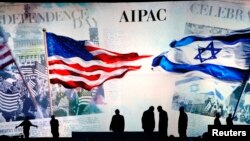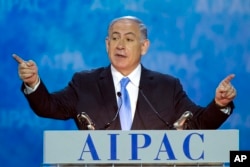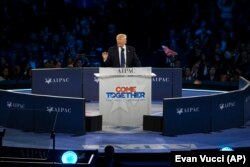Israeli Prime Minister Benjamin Netanyahu and U.S. Vice President Mike Pence are scheduled to headline the 2017 meeting of the American Israel Public Affairs Committee next week in Washington.
The AIPAC Policy Conference, which regularly sees attendance above 15,000 people, is the largest annual pro-Israel gathering in the U.S., and will feature speeches from political leaders like Senate Majority Leader Mitch McConnell and Senate Minority Leader Chuck Schumer, among others.
Thousands of people show up at the conference each year to hear world leaders discuss issues of importance to Israel and its global proponents, and to devise better ways for the U.S. and Israel to work together.
Speakers at this year's conference also include U.N. Ambassador Nikki Haley, Rwandan President Paul Kagame and former Canadian Prime Minister Stephen Harper.
According to the event website, more than two-thirds of congressional representatives will be in attendance as well. Attendees will be able to personally lobby representatives in support of pro-Israel legislation.
Last year, the conference drew a crowd of nearly 20,000 to hear keynote addresses from former Vice President Joe Biden and then-presidential candidates Donald Trump and Hillary Clinton. The crowd was so large that the general sessions of the Policy Conference had to be held in Washington's Verizon Center.
This year, the event will take place as U.S. President Donald Trump's administration has said it will make restarting the Israeli-Palestinian peace process one of its top priorities.
Trump, while hosting Netanyahu last month at the White House, said he thinks he can broker a deal that will be agreeable for both sides, but emphasized that both Israel and the Palestinians will "have to make compromises."
"I'm looking at two-state and one-state" formulations, Trump said. "I like the one that both parties like. I'm very happy with the one that both parties like. I can live with either one."
Trump was a staunch supporter of Israel throughout the 2016 presidential campaign, speaking on several occasions about his affinity for the Jewish state and denouncing the United Nations as biased against the country.
Speaking at the AIPAC conference last year, then-candidate Trump said that when he became president, Israel would no longer be treated like a "second-class citizen" and he would work closely with Netanyahu to "help bring stability and peace to Israel and to the entire region."
"We will send a clear signal that there is no daylight between America and our most reliable ally, the state of Israel," Trump said.
U.S. to boycott 'outrageous' debate
Earlier this week, Haley said the U.S. would boycott a U.N. Human Rights Council session focused on the Palestinians.
Haley called the permanent agenda item requiring members of the council to debate Israeli human rights abuses against Palestinians — the only one of its kind — "outrageous" and said the U.S. would not participate in such discussions.
"The so-called 'Agenda Item 7' discredits the standing of the only U.N. body specifically designed to address the state of global human rights by allowing nations to distract from their own abuses back home by churning out anti-Israel propaganda," Haley said in a statement.
The George W. Bush administration also refused to participate in the council, but the U.S. applied for admission under the Obama administration because, the administration argued, it would be better able to affect policy from within the body.














